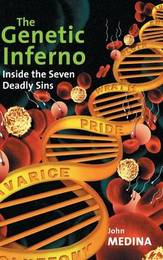
|
The Genetic Inferno: Inside the Seven Deadly Sins
Hardback
Main Details
| Title |
The Genetic Inferno: Inside the Seven Deadly Sins
|
| Authors and Contributors |
By (author) John J. Medina
|
| Physical Properties |
| Format:Hardback | | Pages:356 | | Dimensions(mm): Height 229,Width 152 |
|
| Category/Genre | Popular science
Genetics (non-medical)
Molecular biology |
|---|
| ISBN/Barcode |
9780521640640
|
| Classifications | Dewey:304.5 |
|---|
| Audience | |
|---|
| Illustrations |
Worked examples or Exercises; Worked examples or Exercises
|
|
Publishing Details |
| Publisher |
Cambridge University Press
|
| Imprint |
Cambridge University Press
|
| Publication Date |
7 September 2000 |
| Publication Country |
United Kingdom
|
Description
What makes us react or feel the way we do? If you have ever asked yourself this question, then let gifted writer John Medina take you on a tour of the fascinations and frustrations involved in the quest to understand the biological basis of human behavior. By describing the gap that exists between a human behavior and a human gene, this fascinating book seeks both to clarify and debunk ideas about the genetic roots of behavior, from the genes of divorce to the tendency to eat chocolate. Using Dante's The Divine Comedy as an organizing framework, The Genetic Inferno explains each of the Seven Deadly Sins, but in terms of twentieth century genes and brains. Written by a practising research scientist, this book is not for biologists, but for literature majors, business people, parents, and anyone interested in how our genes work to make us behave the way we do.
Author Biography
Dr John Medina is a molecular biologist on the faculty of the Department of Bioengineering at the University of Washington School of Medicine. He is also a consultant and regular columnist for an American psychiatric organization on the genetics and neurobiology of human behavior. In the course of his research career, which has included the isolation and characterization of genes involved in cardiovascular development, Dr Medina became concerned with the public communication of biological sciences to both lay and professional medical audiences. He was recently recognized as the Merrill Dow/Continuing Medical Education Teacher of the Year.
Reviews'He has admirably attempted to make this as entertaining and easy to read as possible. Indeed, the book's great strength is the lucidity of its exposition of the science of human emotion. further, Medina peppers the text with some quite fascinating examples of seminal research concerning human behaviour ... Medina's prose is energetic and enthusiastic ...'. Canberra Times '... a rich introduction to the current state of the art in understanding the interplay of genes, hormones, synapses and neurotransmitters, which somehow link brains and behaviours ... a cleverly constructed account of some of the most difficult problems of contemporary biology ... welcome additions to the popular literature.' Jon Turney, Times Higher Education Supplement 'Lust, gluttony, avarice, sloth, wrath, envy and pride: Medina successfully uses these sins from Dante's Purgatorio as a vehicle to introduce those genes and their products that influence human behaviours ... Everyone should read the conclusion - in private, unless you enjoy laughing in public.' Hugh Fletcher, The Biologist 'A book to be read by the non-scientist who wants an in-depth view into the workings of genetics, John Medina is clearly an author to do this job. ... the book is a must for philosophers who still get the creeps when they discuss genetics.' Pierre Mallia, Medicine, Health Care and Philosophy, A European Journal
|